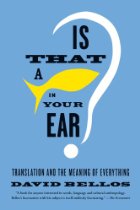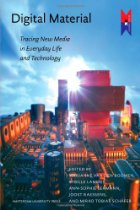Is that a fish in your ear?: translation and meaning of everything
“[Bellos] offers an anthropology of translation acts. But through this anthropology a much grander project emerges. The old theories were elegiac, stately; they were very much severe. Bellos is practical, and sprightly. He is unseduced by elegy. And this is because he is onto something new . . . Dazzlingly inventive.” —Adam Thirlwell, The New York Times
“In the guise of a book about translation this is a richly original cultural history . . . A book for anyone interested in words, language and cultural anthropology. Mr Bellos’s fascination with his subject is itself endlessly fascinating.” —The Economist
“For anyone with a passing interest in language this work is enthralling . . . A wonderful celebration of the sheer diversity of language and the place it occupies in human endeavour. Conducted by a man who clearly knows his stuff, it is a whirlwind tour round the highways and byways of translation in all its glorious forms, from literary fiction to car repair manuals, from the Nuremberg trials to decoding at Bletchley Park.” —The Scotsman
“Bellos has numerous paradoxes, anecdotes and witty solutions . . . his insights are thought provoking, paradoxical and a brilliant exposition of mankind’s attempts to deal with the Babel of global communication.” —Michael Binyon, The Times
“This informed book props open the door to the idea of translation with pop culture . . . This broad-ranging book reads like a survey course in translation, providing a look at its history, detractors, challenges, future—if computers are the future—and current practice, both spoken and written . . . The result is arresting.” —Carolyn Kellogg, Los Angeles Times
“David Bellos writes like a person who chooses his words not only carefully but also confidently and pragmatically. Translation is a challenging enterprise, but one he embraces vigorously and without the gloomy pessimism that leads some to declare that it’s impossible . . . Rich, often playful chapters.” —Jim Higgins, Milwaukee Journal Sentinel
“[A] witty, erudite exploration . . . [Bellos] delights in [translation’s] chequered past and its contemporary ubiquity . . . He would like us to do more of it. With the encouragement of this book, we might even begin to enjoy it —Maureen Freely, Sunday Telegraph
“Is That A Fish In Your Ear? is spiced with good and provocative things. At once erudite and unpretentious . . . [it is a] scintillating bouillabaisse.” —Frederic Raphael, Literary Review
“Forget the fish—it’s David Bellos you want in your ear when the talk is about translation. Bellos dispels many of the gloomy truisms of the trade and reminds us what an infinitely flexible instrument the English language (or any language) is. Sparkling, independent-minded analysis of everything from Nabokov’s insecurities to Google Translate’s felicities fuels a tender—even romantic—account of our relationship with words.” —NATASHA WIMMER, translator of Roberto Bolaño’s Savage Detectives and 2666




